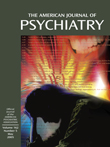Does Memory of a Traumatic Event Increase the Risk for Posttraumatic Stress Disorder in Patients With Traumatic Brain Injury? A Prospective Study
Abstract
OBJECTIVE: The present study examined prospectively the relationship between memory of the traumatic event and subsequent development of posttraumatic stress disorder (PTSD). More specifically, the aims of this study were to 1) investigate the possibility that lack of memory of the traumatic event might be a protective factor; 2) assess whether memory of the traumatic event equally affects the three symptom clusters of PTSD: reexperiencing, avoidance, and hyperarousal; and 3) explore the predictive value of memory of the traumatic event for the development of subsequent PTSD in the immediate aftermath of the event. METHOD: One hundred twenty subjects with mild traumatic brain injury who were hospitalized for observation were assessed immediately after the trauma and followed up 1 week, 3 months, and 6 months later. All participants underwent psychiatric evaluation and self-assessment of their memory of the traumatic event. RESULTS: Overall, 17 (14%) of the participants met full criteria for PTSD at 6 months. Subjects with memory of the traumatic event were significantly more likely to develop PTSD than those without memory of the traumatic event; the difference between the groups resulted primarily from the reexperiencing cluster. Logistic regression analysis revealed that memory of the traumatic event within the first 24 hours is a strong predictor of PTSD 6 months after the event. CONCLUSIONS: Our study indicated that memory of a traumatic event is a strong predictor and a potential risk factor for subsequent development of PTSD. Future studies are needed to show whether these findings can be generalized to other traumatic conditions.



